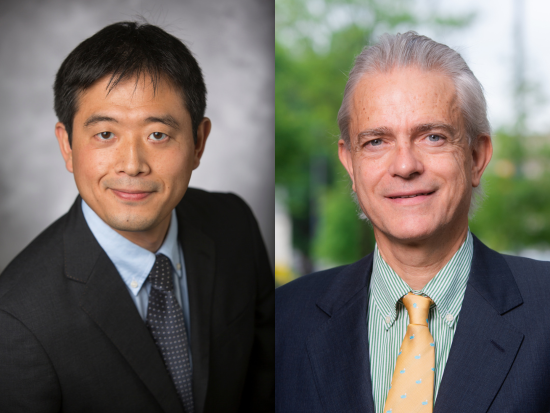 UAB Department of Neurosurgery Assistant Professor Satoru Osuka, M.D., Ph.D., and David Hart White Endowed Professor Erwin Van Meir, Ph.D., recently received funding through O’Neal Invests for their individual Pre-R01 applications.
UAB Department of Neurosurgery Assistant Professor Satoru Osuka, M.D., Ph.D., and David Hart White Endowed Professor Erwin Van Meir, Ph.D., recently received funding through O’Neal Invests for their individual Pre-R01 applications.
The O’Neal Comprehensive Cancer Center’s O'Neal Invests program provides funding for UAB investigators who are conducting new cancer-related research. O'Neal Invests aims to support researchers in investigating essential preliminary work, facilitating the preparation of competitive R01 applications.
Pre-R01 funding is awarded in the amount of $160,000 over two years.
About Osuka’s Project
Osuka’s project, "Targeting radiation-induced invasion in Glioblastoma," will address the lack of effective treatment options for radiation-induced invasive glioblastoma cells.
After analyzing a model of radiation-induced invasive glioblastoma cells and performing repeated irradiation to observe changes in invasion cells during radiotherapy, Osuka and his research team successfully developed the novel collagen-binding-domain-IL-12 (CBD-IL-12), which selectively binds to tumor-cell-expressing collagen type III (COL III) and stimulates the tumor-killing effect by immune cells.
Osuka believes that, through his research, there may be an entirely new therapy on the horizon for glioblastoma treatment.
About Van Meir’s Project
Van Meir’s research goal for his project, “BAI1 Regulation of IGF1R in Medulloblastoma,” is to identify new ways to treat pediatric brain tumor patients, increase treatment success and avoid negative side effects including deficits in intellectual capacity and hormonal imbalances.
In this study, Van Meir and his research team will explore the therapeutic benefit of re-awakening a dormant tumor suppressor gene to block the growth of brain tumor cells by working to better understand the mechanisms of action of BAI1, a cell surface receptor.
Van Meir’s long-term goal is to target BAI1 reactivation with new therapies to improve the survival rate and quality of life for children with medulloblastoma.